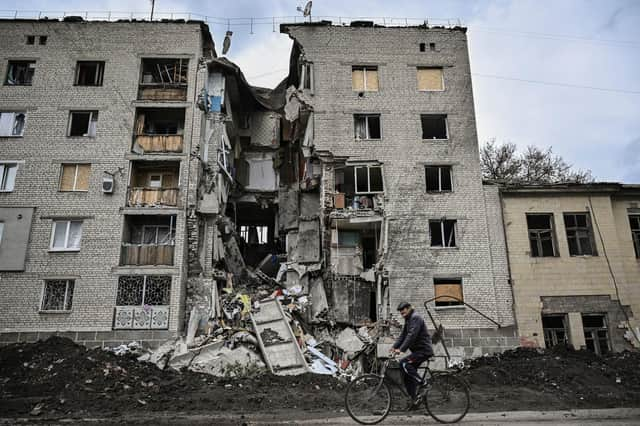Steve Aiken: Ireland can’t fudge its stance on defence – its only choice is NATO


Its aim, regardless of the PR, is to dust off the cobwebs of our ability to fight a large scale war – a war whose likelihood of occurring has risen dramatically since the invasion of the Ukraine, the proxy conflict with Iran all across the Middle East, and move into classic cold war territory with China.
Not for nothing do many commentators see echoes of the late 1930s.
Advertisement
Hide AdAdvertisement
Hide AdHistory doesn’t often repeat itself, but the many parallels are striking.
All around, most of the Atlantic nations are increasing their defence spending, resurrecting their contingency planning and looking to see how they can counter the new threats highlighted by the bloody conflicts in the Ukraine, the Gaza strip and the Bab el-Mandeb.
Most, but not all.
For a nation that prides itself in its ability to influence, hold sway in the UN, being seen as a ‘voice’ of moderation in the EU, an equal partner, or even, as often portrayed, a more rational international actor than its near neighbour, the Republic of Ireland has a strong faith in its ‘soft power’.
Both publicly and privately, whether it is campaigning for nuclear disarmament, criticising Israel for defending its borders, or cataloguing other nation’s indiscretions in their exercising of ‘hard’ power, Ireland has carved out a sense of Irish exceptionalism.
Advertisement
Hide AdAdvertisement
Hide AdAs many of us can attest, whether in Brussels, Washington or indeed even in Stormont Parliament buildings, we regularly receive this perceived wisdom delivered from taoiseach, tanaiste (though thankfully not by the latest one) and far too many officials from the Department of Foreign Affairs and Trade (DFAT).
All this, but with the expectation that when someone hasn’t read their script, for instance, Vladimir Putin, the United Kingdom, the United States and NATO will (discreetly) come in and bail them out.
How this attitude pertains in the era of hybrid warfare, cyber-attacks, long range air and sea autonomous drones, heavily armed semi-state actors is beyond a dereliction of duty on behalf of the Irish State.
But it also exposes the EU, the United States and the United Kingdom to significant threat.
Advertisement
Hide AdAdvertisement
Hide AdThe Irish economy, with its heavy reliance on internet cable connected US multi-nationals, is heavily integrated with the wider Atlantic economic system.
Irish air and sea space is criss-crossed by strategic air/sea and cyber communications links – all completely unprotected.
Furthermore, the Irish Defence Forces are so far behind modern capabilities that they are incapable of operating in a high threat environment, they lack protected armoured vehicles, air mobility, drones, any semblance of C4ISTAR (look it up, most Irish politicians look blankly when you mention even this common defence term), air defence, or even a radar capable of scanning Irish airspace out into the Atlantic.
In short, Ireland’s ‘frontier’ doesn’t even make it to the level of a strategic back door, because quite frankly, there’s no method of shutting it.
Advertisement
Hide AdAdvertisement
Hide AdHowever, there is an option that can quickly start closing that door. Iceland, doesn’t have an air force, army and has only a small coastguard. However its airspace is defended, and defended robustly, by F35 fighters.
At present these come from Norway; their air space (and sea lanes) are monitored and if any threatening activity reaches them, it is responded to.
Why? Because Iceland is in NATO. Finland and Sweden have had long traditions of neutrality, although they never abrogated on their need to adequately defend their borders.
They have realised in the globally changed international system they need greater protection, they too, have joined NATO.
Advertisement
Hide AdAdvertisement
Hide AdThe taoiseach thinks, naively, that he can fudge on defence. Maybe he actually believes in Irish exceptionalism and he can ride out the growing tsunami that’s engulfing us.
But we can’t take that risk. Our Western Alliance, led by the United States, has to iterate to the Irish that we can no longer allow Ireland to be our vulnerable flank.
Either Ireland joins NATO and joins us in sealing the back door, or we take the historical example of the Second World War and we rebuild substantial military capability here in Northern Ireland.
Having the USAF basing an expeditionary air wing at Aldergrove and the US Navy basing some of its destroyers, with their impressive anti-missile and drone systems back in Lisahally would give us all added security.
Advertisement
Hide AdAdvertisement
Hide AdIt would also be a very useful reminder to those in Ireland who still espouse Irish exceptionalism that defence doesn’t come free, and that the United States, as well as the United Kingdom, will always have a strategic self-interest in Northern Ireland.
No doubt more than a few whispered words will be passed in Washington over the shamrock bowls and Guinness, especially as I doubt President Biden will be in much mood for lectures from Ireland on the use of power from a nation that can’t even put two ships to sea safely.
Steve Aiken OBE MLA is former UUP leader